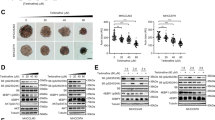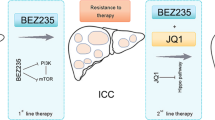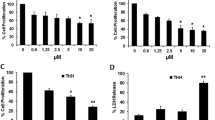Abstract
The transcription factor nuclear factor κB (NFκB) is an essential antagonist of apoptosis during liver regeneration and embryonal development of hepatocytes. Several reports have indicated that NFκB may also inhibit the programmed cell death induced by cytokines, ionizing radiation, or cytotoxic drugs in some cancer cell lines. Because hepatocellular carcinomas (HCCs) are one of the most resistant tumors to systemic chemotherapy, we investigated the activation of NFκB and the consequence of its inhibition by an IκBα-super repressor during tumor necrosis factor α (TNFα)- and chemotherapy-induced apoptosis in HCC cell lines. We demonstrate that both TNFα and adriamycin activate NFκB in hepatoma cells. Activation of NFκB could be blocked through an adenoviral vector expressing the IκBα super repressor, regardless of the activating agent. Inhibition of NFκB enhanced the apoptosis induced by TNFα, whereas IκBα had an anti-apoptotic effect on chemotherapy-induced programmed cell death. A strong inhibition of chemotherapy- and TNFα-induced apoptosis by dominant-negative Fas-associated death domain indicated an essential contribution of death receptor-mediated apoptosis. To elucidate the different role of NFκB in chemotherapy-induced apoptosis, we investigated the expression of Fas (CD95) and Fas ligand (CD95 ligand), which have been described as important mediators of chemotherapy-induced cell death and as target genes of NFκB. However, our investigations demonstrated that in hepatoma cells, the chemotherapy-induced up-regulation of Fas (CD95) and Fas ligand (CD95 ligand) is not transcriptionally mediated through NFκB. Thus, other molecular mechanisms must account for the anti-apoptotic effect of IκBα in adriamycin-induced death of hepatoma cells. In summary, our investigations indicate that the activation of NFκB in response to cytotoxic drugs, in contrast to TNFα, exerts a pro-apoptotic stimulus rather than an anti-apoptotic function, which has implications for therapy of HCCs.
This is a preview of subscription content, access via your institution
Access options
Subscribe to this journal
Receive 12 print issues and online access
$259.00 per year
only $21.58 per issue
Buy this article
- Purchase on Springer Link
- Instant access to full article PDF
Prices may be subject to local taxes which are calculated during checkout
Similar content being viewed by others
Author information
Authors and Affiliations
Rights and permissions
About this article
Cite this article
Tietze, M., Wuestefeld, T., Paul, Y. et al. IκBα gene therapy in tumor necrosis factor-α- and chemotherapy-mediated apoptosis of hepatocellular carcinomas. Cancer Gene Ther 7, 1315–1323 (2000). https://doi.org/10.1038/sj.cgt.7700247
Received:
Accepted:
Published:
Issue Date:
DOI: https://doi.org/10.1038/sj.cgt.7700247



